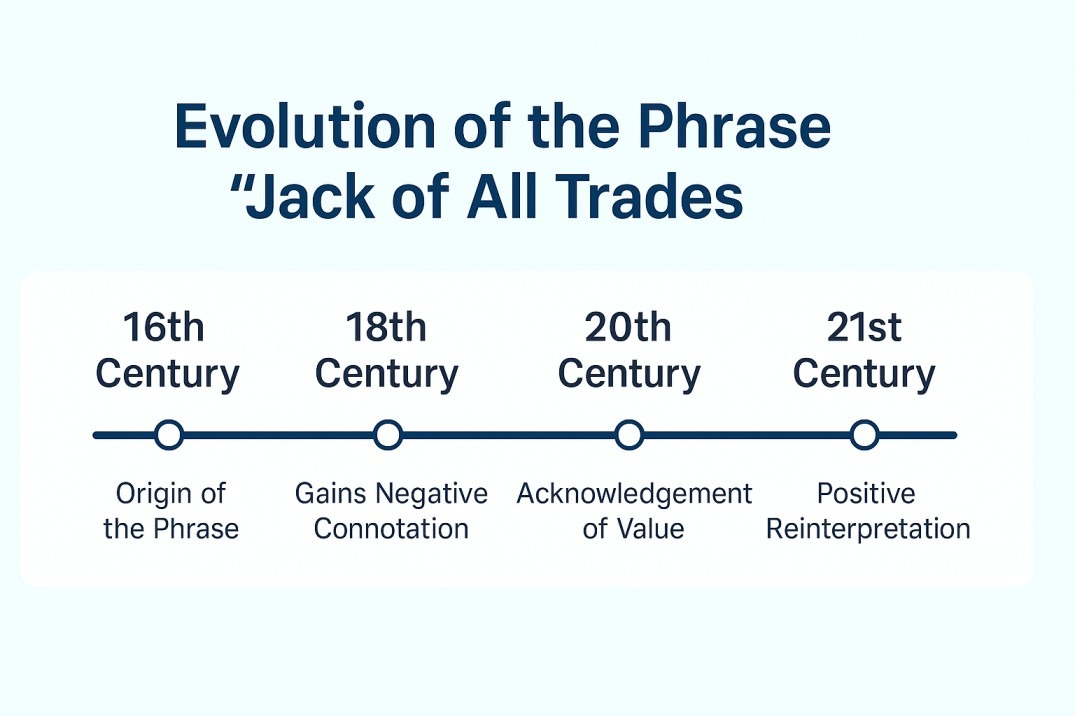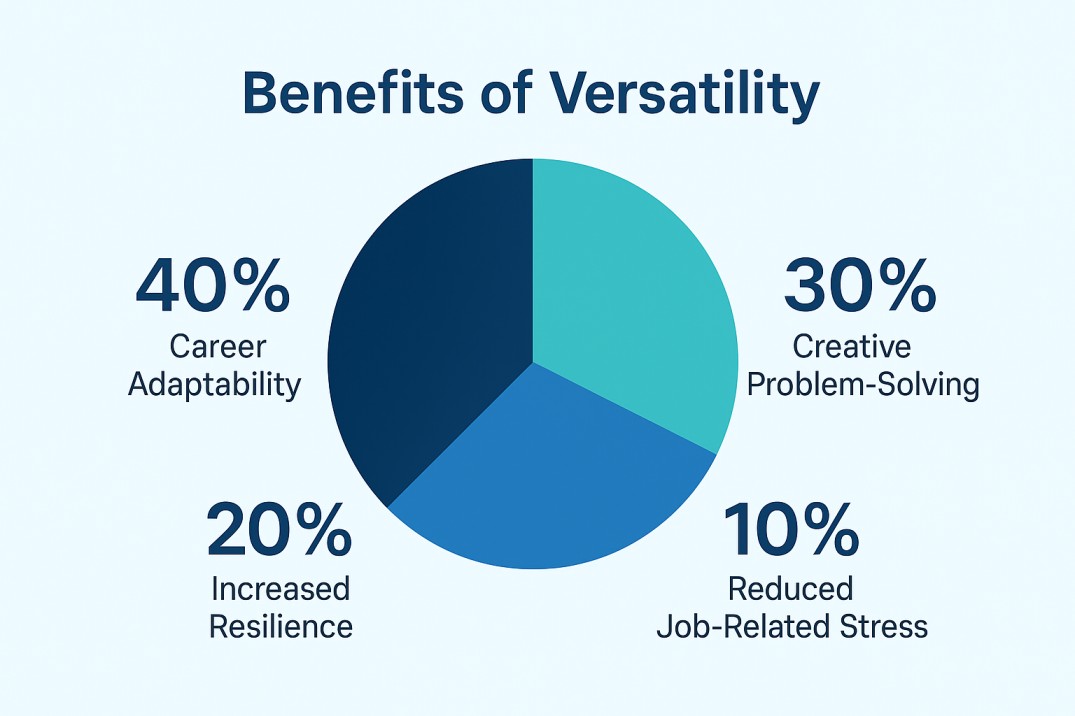In a world where industries are constantly reshaped by technology, globalization, and cultural shifts, one phrase still sparks debate: jack of all trades. Once used as a subtle insult to imply someone lacked mastery, the expression has been reclaimed in the modern era as a badge of adaptability. Today, the ability to thrive across disciplines is not only valuable but often essential.
The Evolving Perception of a Jack of All Trades
The historical meaning of jack of all trades was often followed by the dismissive phrase “master of none.” Yet, history itself is filled with polymaths—Leonardo da Vinci, Benjamin Franklin, Maya Angelou—who flourished precisely because they refused to confine themselves to one narrow lane.
Modern workplaces echo this reality. A marketing professional might also code, design, and manage analytics dashboards. A project manager might switch between HR responsibilities and strategic planning. The stigma is fading because agility has proven to be one of the most resilient traits in a volatile environment.

Why Versatility Matters in the 21st Century
Technology disrupts industries at an unprecedented pace. A skill learned five years ago may already be outdated. Specialists remain vital, but those who can bridge disciplines add irreplaceable value. The jack of all trades individual doesn’t necessarily replace experts; instead, they connect expertise, translate knowledge, and fill gaps.
For example, in startups, one person might handle marketing in the morning, customer support by afternoon, and product testing by evening. Without that flexible mindset, many early-stage businesses would collapse.
A Story of Survival and Innovation
During the pandemic, countless workers were forced to reinvent themselves. A fitness coach learned to record and edit videos. A teacher mastered digital platforms overnight. A small restaurant owner became a skilled online marketer to stay afloat. These transitions weren’t optional—they were survival strategies. And at the heart of each adaptation was the jack of all trades mentality.
The Psychology Behind Being a Generalist
Beyond practicality, there’s a psychological dimension. People who embrace multiple interests tend to develop higher resilience. Studies in behavioral science reveal that individuals with diverse skills often experience greater self-efficacy because they can pivot when circumstances demand.
Rather than clinging to a single identity, the modern jack of all trades draws confidence from the knowledge that they can adapt. That flexibility reduces anxiety in uncertain times and fosters long-term career satisfaction.

From Renaissance Men to Modern Multipotentialites
The romanticized “Renaissance man” has evolved into today’s “multipotentialite.” The internet era makes it easier than ever to explore multiple fields. With online courses, digital platforms, and community-based learning, one person can pick up web design, content strategy, photography, and business management in a single year.
The jack of all trades no longer operates on the margins—they’re often leaders in shaping emerging industries. Multidisciplinary knowledge has been the backbone of entrepreneurs, innovators, and thought leaders who refuse to be boxed in.
The Career Edge of the Jack of All Trades
In recruitment, hiring managers increasingly prize candidates who demonstrate flexibility. While technical mastery in one field is valuable, organizations often face cross-departmental challenges. A candidate who can collaborate with engineers, marketers, and data scientists seamlessly brings synergy.
This is not about doing everything at once but about having the curiosity to learn, the humility to adapt, and the courage to reinvent. The jack of all trades thrives where rigid specialists struggle.
Corporate Examples
- A journalist who also understands data visualization adds depth to storytelling.
- A software developer with marketing insight can craft user-centric products.
- A healthcare worker who embraces technology streamlines patient care and administration.
These are not hypotheticals—they are everyday realities that prove versatility drives innovation.
Balancing Breadth and Depth
Critics often argue that being a jack of all trades comes at the expense of mastery. But in truth, the strongest generalists build “T-shaped skills”—breadth across many areas with depth in at least one. This balance allows them to contribute meaningfully in specialized contexts while still connecting the dots across broader landscapes.
The secret is intentional learning. Generalists succeed when they approach multiple fields with focus rather than dabbling aimlessly. They recognize patterns between disciplines and transform them into fresh insights.
Challenges Faced by the Jack of All Trades
It’s not all smooth sailing. Generalists often confront skepticism, especially in fields that prioritize credentials and narrow expertise. They might feel stretched thin or undervalued in organizations that fail to recognize the worth of hybrid talent.
Yet, resilience comes from turning these challenges into opportunities. The best strategy is visibility: demonstrating how versatility solves problems others can’t. By showcasing cross-functional contributions, the jack of all trades carves out undeniable space in competitive environments.
Thriving in a Fast-Changing World
The modern economy is shaped by rapid transitions—AI automation, remote work, global connectivity, and shifting consumer behaviors. Specialists who cling to outdated frameworks risk obsolescence, while the jack of all trades reinvents and reintegrates continuously.
Whether you’re an entrepreneur, employee, or freelancer, cultivating diverse skills is a long-term investment in relevance. What used to be dismissed as being scattered is now praised as being dynamic.
Final Thoughts
Being a jack of all trades is no longer about mediocrity—it’s about thriving in a fast-changing world. The future doesn’t belong to those who cling to a single skill but to those who weave many threads into a tapestry of adaptability.
The age of rigid specialization is giving way to a new era where multi-skilled individuals are the drivers of innovation, resilience, and sustainable success.
Andrea Balint is a writer and researcher focused on human behavior, workplace psychology, and personal growth. Through her work at CareersMomentum, she explores how mindset, leadership, and emotional intelligence shape modern careers. With a background in communication and HR development, she transforms complex ideas into practical insights that help readers build clarity, confidence, and professional purpose.
